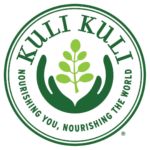
Some people see a terrible situation and shield themselves from it. Others take steps towards it. Pamela Anyoti Peronaci, born and raised in Uganda and a Kuli Kuli supplier, falls into the later category. After witnessing the poverty and day to day hardships her community members faced, she knew she had to help.
After receiving her masters in the United Kingdom and traveling all around the world, she returned to her home country to build a bridge between farmers and consumers. Farmers all across Uganda struggle to find the resources necessary to build their capacity. “They can produce but what does that do if there aren’t opportunities to sell beyond their immediate community”, says Pamela.
Thank you, Mama
Pamela founded Asante Mama as a means to connect over 7,000 farmers throughout Uganda with a bigger market. “Asante Mama” means “Thank you Mama” in swahili, coined after farmers repeatedly thanked her for bringing so much hope into their lives. Asante Mama sells tea, spices and chocolates that come from over 20 different crops her farmers are working with.
With her recent partnership with Kuli Kuli, she has been able to expand production to working with moringa trees. Her majority female team of farmers have had to combat many obstacles but are learning and growing right alongside the newly planted moringa trees. Asante Mama works closely with their farmers and assists with their expansion via trainings and grants. Pamela said the biggest issues are lack of infrastructure, which prevents efficient transport of the leaves, men unwilling to give women access to land and lack of knowledge on hygiene regulations.

Despite all these problems that have kept others away from working with vulnerable female farmers, Pamela has persisted. She understands that when you are not economically independent, you feel down, your voice is suppressed and your views are not followed. “There is no better feeling than the ability to buy your own rice rather than waiting on a man to give you money. Education is important but economic liberation is fundamental.” says Pamela.
Pamela is a builder of Africa’s future and we are honored to be working with her to eradicate hunger and empower women around the globe.











This is positive inspiration communication, I simply love it and edmire Pamela and all who encourage & her Hard-work and tenacity without ulterior motives. we need more like minds put into action as she Has.
Thanks so much for your comment! I completely agree. It was an honor to interview her.
A great source of inspiration!
We think so too!
Wonderful work Pamela … look forward to speaking with you on the 12th March next week @LadyAgri! Bravo
Pamela –
There are hidden miraculous power lying in Moringa and similar plants and trees yet to be enlightened to rest of the world, some one has to come forward with dedication with sacrificing mentality that can be enlightened to utilize the modern community living in the world of chemicals and toxicants. There are many factors can be shared and to brought alight
God bless all our great women achievers today! I hope Kuli, & Ms Curtis can recognize our Veterans one day.